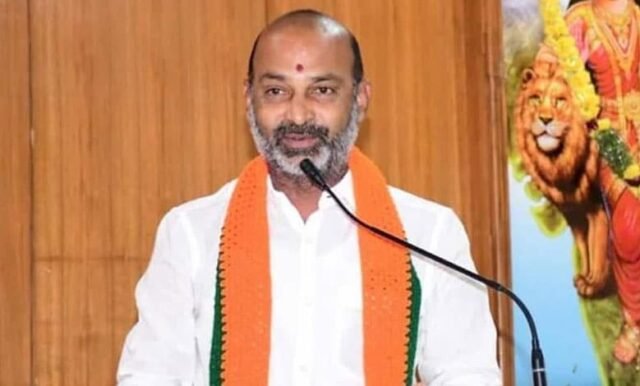Telangana: Three years after Prime Minister Narendra Modi urged BJP leaders to reach out to Muslims from backward classes across India, the party’s outreach to this community in Telangana is facing significant uncertainty. This has become a point of contention amid the ongoing debate over the inclusion of Muslims in the Backward Classes (BC) category in the state.
BJP Leaders Criticize Inclusion of Muslims in Backward Classes
Union Minister of State for Home Affairs and BJP’s Karimnagar MP Bandi Sanjay Kumar recently questioned the inclusion of Muslims in Telangana’s Backward Classes category during a public meeting in Mancherial. Kumar firmly stated that the central government would never approve the inclusion of Muslims in the BC category, dismissing it as “nothing but a laminated piece of paper.”
Kumar’s objections followed the findings of the caste survey conducted by the Congress-led Revanth Reddy government, which was made public on February 4. According to the survey, only 2.48% of Muslims in Telangana belong to the “forward castes,” while 10.08% of Muslims fall under the Backward Classes category, which constitutes 56.63% of the state’s total population.
BJP’s Opposition to Dividing Backward Classes by Religion
Support for Kumar’s stance came from his Cabinet colleague and Secunderabad MP G Kishan Reddy, who also expressed opposition to the classification of Backward Classes into “Hindu Backward Classes and Muslim Backward Classes.” Reddy argued that such a division would harm the interests of other communities within the BC category. Currently, Muslims in the Backward Classes category benefit from a 4% reservation in state government jobs and educational institutions.
Also Read: Will the NDSA Report Arrive on Time? Uttam Kumar Reddy Urges Swift Action on Dam Safety
As the caste survey report has been released, there has been increasing pressure within the BJP to scrap the Muslim quota, with leaders such as Rajya Sabha MP R Krishnaiah, a Backward Classes leader, alleging that the Congress government has undercounted non-Muslim BCs while including Muslims in the category.
BJP’s Pasmanda Outreach Struggles in Telangana
Amidst this controversy, some BJP leaders have acknowledged that the party’s outreach to the Pasmanda Muslim community in Telangana has not yielded the expected results. According to sources, the party has called for a quota for Pasmanda Muslims without properly considering the socio-economic composition of the entire community.
Many Muslims in Andhra and Telangana who belong to the Backward Classes are engaged in traditional caste-based occupations, such as washing clothes and weaving. Despite this, BJP ministers are opposing their inclusion in the Backward Classes list, raising questions about the party’s commitment to the welfare of the community.
PM Modi’s Push for Pasmanda Muslim Outreach
The BJP’s Pasmanda outreach initiative began in Telangana in 2022 after Prime Minister Narendra Modi instructed party leaders to focus on marginalised Muslims. The PM’s directions came after the BJP’s victories in Lok Sabha bypolls in Azamgarh and Rampur, areas with significant Muslim populations.
Ahead of the 2024 Lok Sabha polls, Modi also accused the Congress and Samajwadi Party (SP) of “marginalising the Pasmanda Muslims” and emphasized the need to provide opportunities to the community.
Controversy Over Muslim Reservation in Southern States
The issue of Muslim reservation is especially complex in southern states. In Karnataka, the BJP government led by Basavaraj Bommai scrapped the 4% reservation for Muslims in 2023, stating that religion should not be the basis for reservation. This move did not resonate with voters, as the Congress won the elections by a significant margin.
In Andhra Pradesh, the Telugu Desam Party (TDP)-led NDA government has refrained from supporting the scrapping of Muslim reservation, instead pledging to stand by the Muslim community.
BJP’s View on Muslim Quotas
BJP Minority Morcha national president Jamal Siddiqui clarified the party’s position, stating that while the BJP is not opposed to reservation for economically backward Muslims, it advocates for the 10% reservation under the Economically Weaker Section (EWS) category. He emphasized that the BJP is committed to uplifting backward Muslims, unlike the Congress and SP, which he accused of using Muslims for political gain.
As the debate over Muslim quotas intensifies in Telangana and across India, the future of the BJP’s outreach to the Pasmanda Muslim community remains uncertain. The party’s position on the Backward Classes category could have significant political ramifications in the state.








